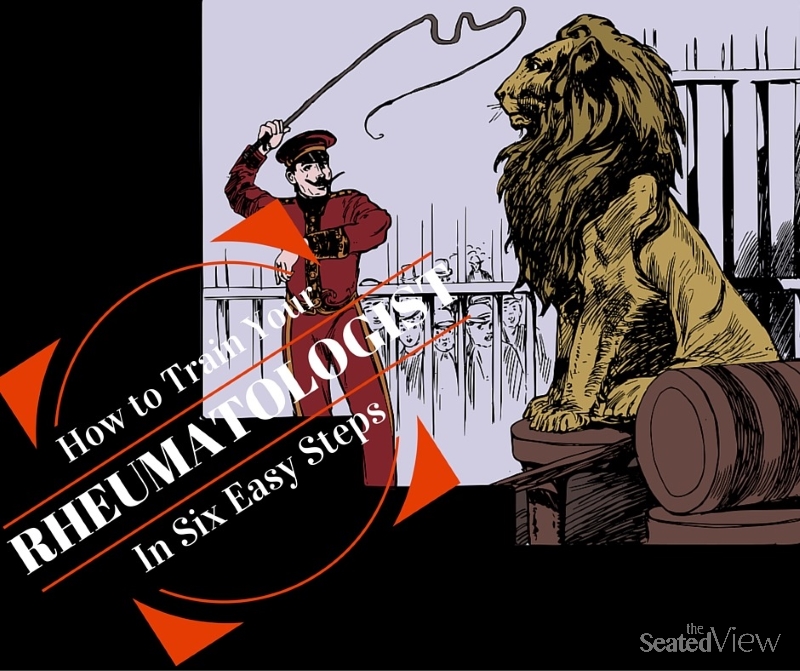How to Train Your Rheumatologist in Six Easy Steps

Congratulations on getting yourself a brand-new rheumatologist!
Rheumatologists — or rheumies, as they are affectionately known in the community — can add so much value to living with any kind of arthritis. Like any other new relationship, though, you have to get used to each other, and your rheumatologist has to come to understand how you approach your life with your condition.
In other words, you have to train them.

I’d like to share some tips on how to approach the training of your rheumie in a way that can enhance your relationship, and help you build a good life with your chronic illness.
1. Move Slowly
Any formal training starts with a slow introduction. With some, this means letting your trainee sniff your hand in order to assess that you are not a threat. And might be a bit weird if you do this with your rheumie.
Here’s another thing you shouldn’t do the first time you meet your rheumie: show up with a binder full of 47 journal articles about your particular illness, and right away informing them that you will be in charge of the relationship. This will likely be interpreted as a threat and could lead to defensive behaviour, maybe even cause the rheumie to outright go on the offensive.
Doing your research from home and distilling it into a single page with no more than 3-5 questions is a much more non-threatening start to your work together. It is also a subtle way of establishing yourself as the alpha in the relationship.
Alpha patient??

Why not.
2. Come prepared
Always come prepared to any training session. This includes bringing treats to help break the ice. Cookies will work, but there are other ways to make your rheumie happy.
Before your appointment, you may want to consider spending some time writing a short — or as short as possible — summary of your medical history and the symptoms that brought you to the appointment. Point form is an excellent format. Presenting your rheumie with documents that can save them time in taking your medical history is a great way to establish trust. In addition, just as the list of questions mentioned above, it demonstrates subtly that you are in charge of your life and the situation.

3. Play and Reward
Play can be an excellent way to warm up anyone, and your rheumie is no exception.
Likewise rewarding behaviour that you want to encourage will begin to build the kind of relationship you want. It could be as simple as thanking the rheumie for their approach when they express that the ultimate decision on treatment is yours. This is a building block in developing a team.
Another building block for your relationship is you showing an interest in the rheumie, asking them questions about their treatment approach, background, how they like their work, and so on. This accomplishes two things: creating a two-way relationship, and giving you a sense of how well the two of you might click.

4. Observe body language
Observe the rheumie’s body language throughout your interactions.
This will give you a sense of how they are responding to your training efforts, as well as an indication of their overall personality. If you crack a joke, and their response is a strained smile, perhaps they are not comfortable with humour. If they spend much of the appointment looking at the computer, rather than maintaining eye contact, this may be something that you’ll want to work on in the next training session. Remember that positive reinforcement works better than anything else.
5. Observe yourself
Remember that there are two people in that the situation. There is the rheumie you’re trying to train, and there is you.
Your behaviour, words, and body language is going to elicit responses in your rheumie. You play a large role in whether your rheumie will be startled and defensive, or open and trusting. Remember that this is much like any other interaction, and act like you would with anyone else with whom you’d like to develop a trusting connection.

6. Give it time
No one is going to finish training in one session.
Building a relationship takes time, so give yourself and your rheumie at least 3-4 appointments to get a good foundation going. This should be enough to tell you whether you’ll be able to train build the kind of relationship you’re looking for, or whether you may want to start looking for another rheumie.
This post is focused primarily on what you can do to train your rheumatologist, but it’s important to keep in mind that this is a two-way relationship. In effect, you are training each other, adapting to each other’s styles and personalities, creating a unique relationship based in trust and, hopefully, mutual respect and maybe even affection.
Do you have any other tips for training a rheumatologist? Please leave them in the comments!
(an earlier version of this post originally appeared on the Your Life with RA book site)
Tag: doctor, new doctor, RA, rheumatoid arthritis, rheumatologist, rheumie, train
7 Comments
Read More
Discover what else I've been writing about...
















Laugh, either laugh at the first training session, or go home. Get the doctor to laugh at her/him self and then you keep that one.
Yes! Best way to know if you’ve got a keeper.
Great tips Lena. It takes time to build up that relationship and sometimes people go into that first appointment and try to tell the doctor how to treat them. That doesn’t bode well for a relationship. Go slowly and hopefully it gets to become a doctor-patient relationship where both parties listen to each other.
By the way, I’ve nominated you for the Disabled Blogger Award https://despitepain.com/2019/04/21/disability-blogger-award-by-chronillicles/
Exactly. Telling someone how to behave towards you the minute you meet them isn’t good for any relationship.
Thank you so much for the nomination! I’m honoured.
I have a rheumatologist but so far I’ve only seen the registrars on his team. My last appointment was a disaster, he was very abrupt, hardly said a word, dismissed the fact that I’d new symptoms since the last visit, I even wrote them down, he didn’t even look. I have severe osteoarthritis in my hands and back and inflammatory arthritis everywhere related to an as yet unnamed autoimmune disease, my liver is too damaged by meds to get DMARDS for autoimmune. I tried asking a couple of questions about where my life was going and ended up breaking down, he sat there coldly and eventually handed me a tissue. Told me I’d get an appointment for an injection into one of my joints that’s particularly bad and an appointment for fibromyalgia physio and back to rheumatology in 6 months!!! 6 months? I’d been told at my last appt every 3!! Couldn’t get any joy out of him, he looked at the computer and said I can’t give you anything you’re already on venlaflaxine (antidepressant) because I was crying??? and l left his office still sobbing and got into my car and sobbed all the way home, nice going doc I could have crashed the car.
My previous rheumatology appt 3 months previous was brilliant, the registrar was so caring and informative. She explained all about autoimmune diseases and counselled me on DMARDS, looked at my joints especially my hands and said oh you poor thing we have to get those sorted for you (I wanted to hug her) explained that I have to have regular liver tests and once they improve I’ll be able to get the right treatments for autoimmune. Since I saw her I had 4 bad infections (including abscesses) 5 antibiotics and a heap of extra painkillers, the skin on my fingers and toes started peeling off like bananas (think layers) certain foods are now making me violently ill and other new side effects. None of these went on to my file as the recent appt was a no go. All along I’ve been told that diagnosing an autoimmune disease is partly tests and partly discussing symptoms and side effects and putting them altogether. What happens when you get a doctor that doesn’t seem to give a damn. He made me feel like an inconvenience and I didn’t understand why I was there if all he was going to do was give me an appointment for 6 months time, an appointment for an injection and physio with the fibromyalgia team (fibromyalgia why??) no explanations, nothing!! I’m 50 years old I felt like a child coming out of that room, too upset to stand up for myself and ask for answers. Or at least tell him he had the worst bedside manner I’ve ever seen!! I contemplated a letter of complaint, but I’m too scared I’ll see him again. I live in Ireland by the way and I know our medical system sucks and everything takes so long, and yes I’m in the rheumatology system but it’s a team of them under the main professor. I won’t have any relationship with them as each time I go it could be someone else or even one day it might be the main man!! I’ve referrals to various different departments for various things as I’ve so much going on and I’m in the middle of a full liver screening at the moment, the Liver man the other day was so lovely and again such a contrast to the rheumatologist a few weeks ago I nearly cried in gratitude. He went back on my bloods for ten years. The same parts of my liver now seem to have always had some levels of abnormalities. He sent me there and then for every single liver blood test possible, the veins in my arm actually collapsed half way through and they had to finish on the other arm, so many vials. I’ve to get an ultrasound of liver too and when I go back to him he will have all the information he needs. I actually left the hospital smiling this time. He made me feel like he really cared about my health and wanted me to get better. Anyway I think I’ve made this comment into a short novel by now, but you can see my problem, how do I sort my rheumatologist when it’s more than one person?
Erik Vick recommended you Lena by the way, I’m on his Facebook page and we discuss our illnesses sometimes, he said you are amazing!
Follow up… l got an appointment for my ultrasound of my liver…March 2020!!! Really

Am at the pain management clinic soon and I’m going to tell them I can’t live like this anymore, I’m losing my mind.